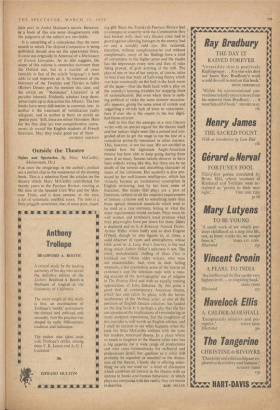Outside the Theatre
Sights and Spectacles. By Mary McCarthy. (Heinemann, 18s.) FOR once the misgivings in the author's preface are a perfect clue to the weaknesses of the ensuing book. This is a selection from the articles on the theatre which 'Mary McCarthy contributed for twenty years to the Partisan Review, starting at the time of the Spanish Civil War and the MOS- COW Trials, and it does contain, as she says, a lot of systematic youthful scorn. The tone is a little priggish sometimes, that of some pure, exact- ing girl. Since the Trotskyite Partisan Review had to compete in austerity with the Communists they had broken with, their very theatre critic had to guard against allowing hostages to the enemy, had to cast a suitably cold eye. She reviewed, therefore, without cornplimentaries and without compliments; many of her findings have a kind of correctness in the higher sense and the reader has the impression every now and then of rules being proved, of grist arriving at the mill. The plan of one or two of her notices, of course, takes its heat from that body of Left-wing theory which was kept continually on the boil in the back room of the paper—thus she finds fault with a play on the country's housing troubles for stopping short of nationalisation. But even when there is noth- ing political at stake the same manner occasion- ally appears, giving the same sense of system and suggesting a certain lack of juice or enjoyment : here if ever she is the expert in the less digni- fied forms of error.
Add to this that she emerges as a very literary writer with no special regard for the theatre itself and her notices might seem like a pained and mis- guided effort to get the stage to toe the line of a radicalism primarily interested •in other matters. This, however, is not the case. We are entitled to wonder how the legitimate Anglo-American theatre has been able to keep going during these years if so many famous talents deserve to have their withers wrung like this, but there can be no doubt of the serious and disturbing character of many of her criticisms. Her austerity is also pro- duced by her well-known intelligence, which has virtually become an institutional assumption in English reviewing, and by her keen sense of literature. She thinks that plays are a part of literature, subject to all the essential requirements of literary criticism and to something more than those special theatrical standards which tend to be used as a rear entrance, letting in what the other requirements would exclude. Plays must be well written and producers must produce what their playwrights have put down for them. Odets is deplored and so is A Streetcar Named Desire. Arthur Miller writes badly and so does Eugene O'Neill, though he also figures as, at times, a solid observer of types and atmospheres, whose Irish actor in A Long Day's Journey is the real thing which Arthur Miller's salesman is not. The stock, melodramatic stuffing of Huis Clos is knocked out ('those older writers, who were not existentialists, had, even in their failing moments, a less journalistic sense of the horror of existence'), and the selection ends with a rous- ing account of the 'pornographic' use of religion in The Potting Shed and with an equally rousing appreciation of John Osborne. By this point a good deal of contemporary American drama, which has also taken its place, with the heroic incoherence of the Method actor, as one of the positives of English theatre criticism, has landed on the slag heap. It is perhaps a pity that she has not considered the implications of remaindering so many accepted reputations, but the toughness of this outsider is well worth an English edition, and I shall be curious to see what happens when the taste for Miss McCarthy collides with the taste for modern American drama. In a place where so much is forgiven to the theatre critic who has a big appetite for a wide range of productions and who cares tremendously for technical and professional detail, her qualities as a critic will probably be regarded as unsuited to the discus- sion of the theatre. Clearly she is offering some- thing we are not used to: a kind of discussion which combines an interest in the theatre with an interest in books and human behaviour, in which plays are compared with the reality they are meant


















































 Previous page
Previous page